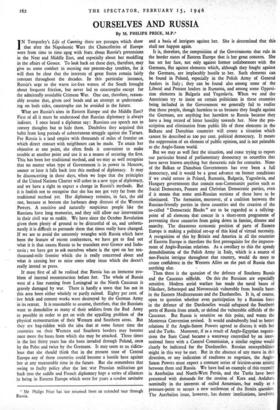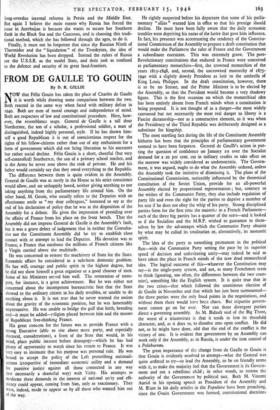OURSELVES AND RUSSIA
By M. PHILIPS PRICE, M.P.*
I N Temperley's Life of Canning there are passages which show that after the Napoleonic Wars the Chancelleries of Europe were from time to time agog with fears about Russia's pretensions in the Near and Middle East, and especially about her meddling in the affairs of Greece. To look back on these days, therefore, may give us some comfort in meeting our present-day troubles, for it will then be clear that the interests of great States remain fairly constant throughout the decades. In this particular instance, Russia's urge to the warm ice-free waters of the South brought about frequent friction, but never led to catastrophe except for the admittedly avoidable Crimean War. One can, therefore, reason- ably assume that, given cool heads and an attempt at understand- ing on both sides, catastrophe can be avoided in the future.
What are Russia's aims in Eastern Europe and the Middle East? First of all it must be understood that Russian diplomacy is always indirect. I once heard a diplomat say: Russians use speech not to convey thoughts but to hide them. Doubtless they acquired this habit from long periods of subterranean struggle against the Tartars. For Russia is a land empire with thousands of miles of frontier on which direct contact with neighbours can be made. To attain her objective at one point, she often finds it convenient to make trouble at another point and use it as a means of securing the first. This has been her traditional method, and we may as well recognise that no matter what type of Government is in power in Moscow, sooner or later it falls back into this method of diplomacy. It may be disconcerting in these days, when we hope that the principles of the United Nations Charter will usher in a new type of diplomacy, and we have a right to expect a change in Russia's methods. But it is foolish not to recognise that she has not got very far from the traditional method yet. Her diplomacy remains, in fact, the old one, because at bottom she harbours deep distrust of the Western Powers. A sensitive and naturally suspicious people like the Russians have long memories, and they still allow our intervention in their civil war to rankle. We have since the October Revolution given them plenty of ground to be distrustful of us, and unfortu- nately it is difficult to persuade them that times really have changed. If we are to avoid the unseemly wrangles with Russia which have been the feature of recent conferences, we have got to find out what it is that causes Russia to be truculent over Greece and Indo- nesia; we have got to ask ourselves where is the spot on her ten- thousand-mile frontier which she is really concerned about and what is causing her to raise some other issue which she doesn't really intend to press.
It must first of all be realised that Russia has an immense pro- blem of internal reconstruction before her. The whole of Russia west of a line running from Leningrad to the North Caucasus is gravely damaged by war. There is hardly a town that has not in this area been either wholely or partly ruined. Eighty per cent. of • her brick and cement works were destroyed by the German Army in its retreat. It is reasonable to assume, therefore, that the Russians want to demobilise as many of their soldiers from the Red Army as possible in order to get on with the appalling problem of the physical reconstruction of their Western and Southern areas. But they are hag-ridden with the idea that at some future time the countries on their Western and Southern borders may become once more the bases from which she may be attacked. Three times in the last thirty years has she been invaded through Poland, once by the Poles and twice by the Germans. It may seem to us ridicu- lous that she should think that in the present state of Central Europe any of these countries could become a hostile base against her at any measurable time in the future. But she remembers that owing to faulty policy after the last war Prussian militarism got back into the saddle and French diplomacy kept a series of alliances in being in Eastern Europe which were for years a cordon sanitaire
Mr Philips Price hai hist returned from an extended tour through Russia.
and a basis of intrigues against her. She is determined that this shall not happen again.
It is, therefore, the composition of the Governments that rule in the border states of Eastern Europe that is her great concern. She has set her face, not only against former collaborators with the Germans, gut against elements which, although they fought against the Germans, are implacably hostile to her. Such elements can be found in Poland, especially in the Polish Army of General Anders in Italy ; they can be found also among some of the Liberal and Peasant leaders in Rumania, and among some Opposi- tion elements in Bulgaria and Yugoslavia. When we and the Americans try to insist on certain politicians in these countries being included in the Government we generally fail to realise that these people, though harmless to us because they fought against the Germans, are anything but harmless to Russia because they have a long record of bitter hostility towards her. Now the pro- scription and elimination from public life of these elements in the Balkans and Danubian countries will create a situation which cannot be described as too per cent, political democracy. It means the suppression of an element of public opinion, and is not palatable to the Anglo-Saxon world.
But we may as well face the situation, and cease trying to export our particular brand of parliamentary democracy to countties that have never known anything but theocratic rule for centuries. None of the Balkan or Danubian Governments has ever been a full democracy, and it would be a great advance on former conditions if we could secure in Poland, Rumania, Bulgaria, Yugoslavia, and Hungary governments that contain non-Communist parties such as Social Democrats, Peasant and Christian Democratic parties, even if it means that some anti-Russian sections of these have to be eliminated. The formation, moreover, of a coalition between the Russian-friendly parties in these countries and the creation of the so-called "Democratic Blocks" are to be regarded as a rallying- point of all elements that concur in a short-term programme of preventing these countries from going down in famine, disease and anarchy. The disastrous economic position of parts of Eastern Europe is making a political set-up of this kind of virtual necessity. A recognition of this by Britain and America in all the countries of Eastern Europe is therefore the first prerequisite for the improve- ment of Anglo-Russian relations. As a corollary to this the speedy demobilisation of the Polish Army in Italy, which is a source of neo-Fascist intrigue throughout that country, would do more to create confidence in the Western Allies on the part of Russia than anything else.
Then there is the question of the defence of Southern Russia and the Caucasus oilfields. On this the Russians are especially sensitive. Modern aerial warfare has made the naval bases of Nikolaev, Sebastopol and Novorossisk vulnerable from hostile bases in the Eastern Mediterranean and the Dardanelles. It is, of course, open to question whether even participation by a Russian force in the defence of the Dardanelles would safeguard the Southern ports of Russia from attack, or defend the vulnerable oilfields of the Caucasus. But Russia is sensitive on this point, and wants the Montreux Convention revised. It would undoubtedly lead to better relations if the Anglo-Saxon Powers agreed to discuss it with her and the Turks. Moreover, if as a result of Anglo-Egyptian negotia- tions the Suez Canal became a waterway controlled by an inter- national force with a Control Commission, a similar regime would clearly be indicated for the Dardanelles. Russian susceptibilities might in this way be met. But in the absence of any move in this direction, or any indication of readiness to negotiate, the Anglo- Saxon Powers must expect a constant series of friction-areas arising between them and Russia. We have had an example of this recently
in Azerbaijan and North-West Persia, and the Turks have been presented with demands for the cession of Kars and Ardahan, nominally in the interests of exiled Armenians, but really as a pressure-point to secure a new settlement of the Straits question. The Azerbaijan issue, however, has deeper implications, involving
long-overdue internal reforms in Persia and the Middle East. But again I believe the main reason why Russia has forced the issue in Azerbaijan is because she wants to secure her Southern flank in the Black Sea and the Caucasus, and is choosing this tradi- tional method, which she has followed through the ages, to do it.
Finally, it must not be forgotten that since the Russian Ninth of Thermidor and the " liquidation " of the Trotskyists, the idea of World Revolution has been dropped. Instead the rulers of Russia see the U.S.S.R. as the model State, and their task as confined to the defence and security of its great land-frontiers.



























 Previous page
Previous page